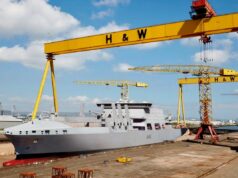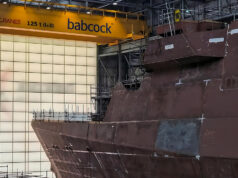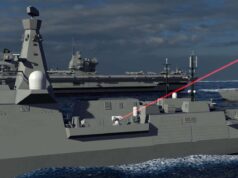BAE Systems shared exciting information about new shipbuilding academy at their Clyde shipyard.
The UK Defence Journal was lucky enough to be invited to the BAE Systems shipyard at Govan in Glasgow for a media day, where myself and others were given a very informative and detailed breakdown of the plans the firm has for the overall Type 26 Frigate project, the plans for a new shipbuilding hall and their plans to invest in their people and the skills of new apprentices.
One thing that really shone through in conversations with the management at BAE Systems was the references to “our people” and “our teams”. I really got the impression that the bosses cared about their staff and, just as importantly, cared about their industry. That impression was solidified when talk moved to BAE Systems’ intention to establish an industry-led Applied Shipbuilding Academy.
Nadia Savage, Business Operations Director at BAE Systems, described the plans for an academy and why BAE Systems want to build it, “In the past, there’s no secret that shipbuilding, like many other industries, has gone through a cyclical kind of movement and that has had an impact on skills, not just in shipbuilding but across manufacturing in the UK generally.”
“The Applied Shipbuilding Academy is very much about emphasising skills that are needed in this sector. It is not just about our trade groups. It is about every part of the business that’s needed to plan, deliver and integrate these complex systems at a better price point and faster than we have in the past”.
Nadia also described part of the scope of the academy and how it’ll work, explaining how it’ll benefit the 190 new apprentices BAE Systems plan to bring on next year “It is the shop floor to the boardroom and all the skills in between, we will be majoring in on our trades and all those applied to practical skills, it’s about giving them a really good apprenticeship experience really getting hands-on”. I was told that this will involve welding and electrical experience on bits of ship that are representative of the ship, and not just learning the trade in the classroom environment.
BAE Systems is also keen to include the wider industry and academia in these plans, they told us that “the doors are open. This is about the industry collaboration that’s needed. And other parts of the maritime industry are being encouraged to join us in this endeavour”.
Next up, I’ll be talking about the status of the ships and the overall status of the programme. Stay tuned!













I suppose better late than never, I assume BAE Marine Scotland did not have an Apprentice Training Centre up to now?
The issue is that you can fast track apprentices to have certain narrow skills and be ready to learn how to learn but you don’t turn out fully qualified trades.
That is the bit of skills and training nobody in HMG wants to hear.
Shipbuilders suddenly have started investing. This can only be good news.
Wasn’t the reason they got the Rivers to build at least in part was to not only keep skills but to be able to maintain Apprentice intake. Memory may be deceiving me.
I’d love it if they made their Mission statement:
“Iron Bru-therhood ,Made in Scotland…from Girders”
As 11 year old kids one of my mates heard you could use Irnbru instead of petrol in a moped. Long story short it doesn’t work😂😂😂
Good news , skilling up the work force , improved dock yards and navy orders for a decade or two.
As an ex shipbuilder, this looks like great news, if this is evidence that the relevant people are now prepared to think about the future of the industry beyond orders already in hand. Long term viability of shipbuilding will never be assured without stategic thinking like this.
Let’s hope the orders go with it. Hopefully 2 ship build yards and 1 sub build yard can meet the navy’s ship requirements for the future and the government keep the orders coming steadily. It’s probably easier to ramp up production when you already have a good base rather than starting from nothing.
Also with a steady build rate that should produce steady maintenance work for the repair/refit yards.
Yes, continuity is key. There is a lot of knowledge which is not on the computer or in manuals but in the heads of the people with lifetimes of real life experience. If you lose those people through gaps in production you are in big trouble e.g. the Astute program which virtually ground to a halt and required emergency assistance from Electric Boat.
Exactly, it looks like a good idea, and probably way overdue. However, I am a little wary of the term ‘apprenticeship’ used today. My father in-law was in the ship building industry at Govan, His apprenticeship lasted 5 years, as all apprenticeships did.
Time will tell if the training is thorough enough.
Precisely.
Unfailable qualifications are a disease that needs to be eradicated ruthlessly.
Yes indeed. Apprenticeships as we remember were one of the casualties of Tony Blair’s fixation with degrees as the answer to everything (don’t get me started!) and for my money a lot was lost in terms of training involving practical skills.
Ah yeah another one of good ol’ Tones clever ideas…..complete and utter tosser that man.
Back in the day, we went to college one day a week, and spent the other four days in the training school. First 18 months or so was making your toolbox, then the tools to go in it. After that you went out and about the factory, spending time in maintenance department, toolroom, cutter grinders etc etc. After 4.5 years or so, and if you were lucky, you’d be offered a job in one department or another. I got a job in the toolroom. Halcyon days.
The apprentice,s get good training as they have done for MANY years.
Hopefully they will be looking to skill up apprentices in the latest skills and technology preparing them for the future. As I was asked when I was once an apprentice what’s better 20 years experience or 1 years experience 20 times over. Sadly in engineering I found to many counted the latter as 20 years experience.
It’s good and sorely needed. One of the reasons the build is so slow on HMS Glasgow is lack of skills. The best people left the Clyde ten years ago and went to Barrow as part of the Successor ramp up.
‘I really got the impression that the bosses cared about their staff and, just as importantly, cared about their industry.’
If they don’t no one else will. This is excellent news. Not before time.
Congratulations George on your invitation. Due recognition of what you have achieved with UKDJ.
Should think so they’ve been handed nearly all warship building, yes handed, And the SNP want independence.
“In the past, there’s no secret that shipbuilding, like many other industries, has gone through a cyclical kind of movement and that has had an impact on skills, not just in shipbuilding but across manufacturing in the UK generally.”
Only taken us 50 years to get this message. Painful to watch the damage done to so much of our industrial base because this simple message has been totally ignored. Ironically in the areas where it hasn’t the UK has done exceptionally well even against widespread completion but sadly so much has been lost to ignoring such innate rules for success as if Britain could ignore all those foreign ways by Johnny Foreigners.
What a wonderful idea….we here in the U.S. desperately need the same…